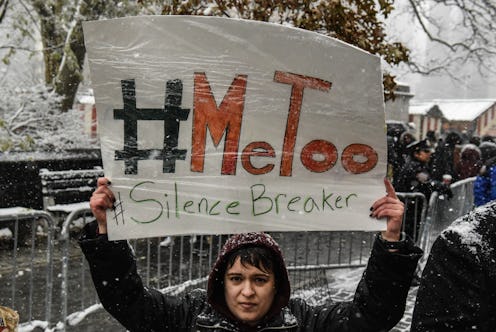News
How Sexual Harassment Claims Changed In 2017

In 2017, there's been a wave of high-profile sexual harassment allegations leveraged against powerful men across all industries, from Hollywood to Silicon Valley. Women have spoken up to say their companies fostered toxic environments conducive to harassment, and in this new culture of accountability, the way women are handling sexual harassment claims has changed dramatically. In fact, social media now plays a crucial role in helping women speak out against their assailants.
"I really believe in the role that social media has played in breaking the sense of isolation and shame and stigma that has always surrounded being a victim of sexual harassment," Kristen Houser, chief public affairs officer at the National Sexual Violence Resource Center and the Pennsylvania Coalition Against Rape, tells Bustle. "We have been watching a slow erosion."
Houser cites hashtag campaigns throughout the years, from #WhyIStayed in 2014 to #MeToo in 2017, as "evidence that we are culturally breaking down that isolation, shame, and stigma that has historically kept people silent."
She not only credits social media for the revolution that's taken place in 2017, but also the notoriety of Harvey Weinstein's accusers.
When you have someone who is well-known come forward and say "this happened to me" and name the person that did it, that can really help people who aren't celebrities think, "If they can come forward and speak their truth, maybe I can, too."
There's a camaraderie created online after these kinds of allegations come to light, Houser explains — "It's like group therapy."
Because more women are comfortable coming forward, sexual harassment claims are expected to increase in 2018, according to the Institute for Corporate Productivity report, "HR & the Weinstein Effect." In addition, a trend we've witnessed in 2017 is that more industries are no longer blacklisting women for speaking up, and more men are facing consequences. Weinstein was fired from his company, and Uber Chief Executive Travis Kalanick felt pressure to resign after former employee Susan Fowler wrote a blog post about the harassment she faced at the company and how her supervisors silenced her.
"There needs to be a truth and reconciliation around our patriarchal culture."
Weinstein hasn't denied most of the allegations against him, saying in a statement, "I appreciate the way I've behaved with colleagues in the past has caused a lot of pain, and I sincerely apologize for it. Though I'm trying to do better, I know I have a long way to go." He does deny any allegations of nonconsensual sexual contact. And while Kalanick launched an investigation into Fowler's claims, saying, "There can be absolutely no place for this kind of behavior at Uber — and anyone who behaves this way or thinks this is OK will be fired," he ultimately took responsibility for the toxic culture that thrived under his leadership.
And while the past few months of awareness may not be enough to change the ways of serial abusers, at least it's encouraging some people to reconsider their behavior.
"This type of self-reflection is important, but it's only the first of many steps," Paola Mendoza, artistic director of the Women's March, tells Bustle.
Men need to talk to women in their lives openly and honestly about what they are guilty of. They need to ask themselves why they acted inappropriately and then they need to ask for forgiveness, both of the women in their lives and, if possible, the women they hurt. There needs to be a truth and reconciliation around our patriarchal culture.
There's still a long way to go, but the rise in sexual harassment claims has resulted in many companies revisiting workplace policies and training.
"Anecdotally, I've been having conversations with people in their own workplaces that I was not having six months ago," Houser says. "I had one [recently] with a company president who was being really thoughtful about this. They recognized 'this is really a problem and we need to address it properly.'"
She hopes the wave of allegations that came in 2017 will start "conversations in boardrooms as well as at dinner tables."
Houser also believes that holding silent bystanders accountable has helped shift the culture surrounding sexual harassment. "I feel like that's made for a rich conversation that additionally may be helping people feel like, 'people really get this and I'm willing to tell my story," she says.
At the same time, she notes, some women do worry that this reckoning is too good to be true.
People are asking, "Is there going to be backlash? Are we going to lose that momentum?" But I feel like the trajectory each time when we have a phenomenon like this, is it gets bigger and bigger and bigger every time.
Still, it's too soon to say for certain that 2017 has had a permanent effect on workplaces.
"I will say, any executive who is ignoring this right now, I think it's really gambling and being irresponsible, because we are watching people from all kinds of sectors come forward now," says Houser. Mendoza too feels that "hard, raw, and scary conversations," like the kinds we've had in 2017, are the key to systematic change.
It's not only important for victims to speak up, but for the silent bystanders to also find their voice in 2018.
As Houser says:
I'm more hopeful that the bigger effect right now is on colleagues and co-workers who might hear something or see something and it makes them feel uncomfortable. I think those are the people that are reconsidering their responsibility to speak up. Messages about silence equals complicity are being heard and felt by a lot more people, and that can help weed out people who are abusing their power much more quickly.